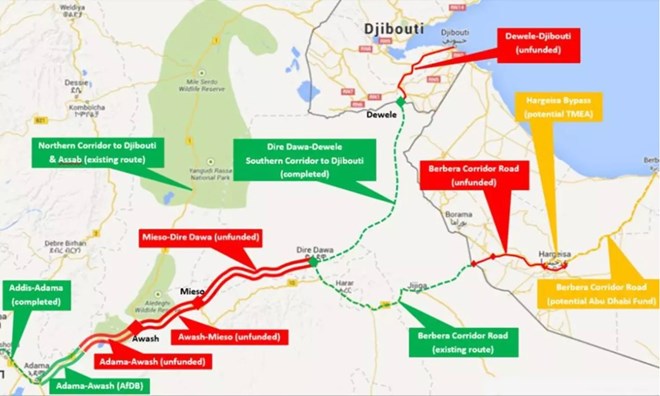Our Terms & Conditions | Our Privacy Policy
World Bank approves $90M to boost Djibouti-Ethiopia trade corridor
Saturday September 21, 2024

This map highlights key infrastructure projects across the Djibouti-Ethiopia corridor and adjacent regions. It showcases both funded and unfunded road segments, including the vital Southern Corridor connecting Djibouti with Ethiopia, as well as potential trade routes through Somaliland’s Berbera port. CREDIT/ Logistics Update Africa
Djibouti City (HOL) — The World Bank has approved an additional $90 million in financing to expand the Djibouti Regional Economic Corridor, a major infrastructure project to boost regional connectivity and trade in the Horn of Africa.
This latest funding brings the total project funding to $160 million, following the initial $70 million approval in December 2021.
The new financing will be used to rehabilitate and maintain three sections of the Djibouti-Addis Southern Corridor, a critical trade route linking Djibouti with Ethiopia. It will also support transit facilitation measures and provide technical assistance to Djibouti’s government to enhance corridor management.
The project also includes the construction of key access roads, climate-friendly storage, and auxiliary market facilities, with reserved sections for women traders to ensure inclusivity in the region’s economic growth.
“This additional support will further strengthen Djibouti’s position as a regional trade hub and improve the lives of its people,” said Ousmane Dione, the World Bank Vice President for the Middle East and North Africa, during his visit to the country. “The project will also help Djibouti achieve its Vision 2035 goals, which focus on economic diversification and social inclusion.”
Djibouti, positioned at the crossroads of critical global shipping lanes, is a pivotal hub for trade in the Horn of Africa. The nation’s port infrastructure is a lifeline for landlocked Ethiopia, handling over 90% of its imports and exports. This port activity is a major contributor to Djibouti’s economy, with Ethiopian cargo generating between USD 1.5 to USD 2 billion annually in tariffs and fees. The country relies heavily on its port operations, which make up 85% of its GDP. The corridor project is part of the Horn of Africa Initiative, launched in 2019, which aims to deepen economic ties and foster regional cooperation among Djibouti, Eritrea, Ethiopia, Kenya, and Somalia, which is among the world’s most economically challenged regions.
“We are determined to lead the way in regional development and integration. Our continued investment in infrastructure will enable us to harness the full potential of this collaboration,” said Djibouti’s Minister of Economy and Finance, Ilyas Moussa Dawaleh. He expressed gratitude to the World Bank for its ongoing support in enhancing connectivity across the region.
Despite its small size, Djibouti’s location along some of the busiest global shipping routes, including the Red Sea and Indian Ocean, makes it a strategic player in regional and international trade. However, the country faces vulnerabilities, including heavy dependence on global maritime transport, regional instability, and its reliance on Ethiopia for much of its trade. Djibouti’s Vision 2035 aims to diversify the economy and solidify its role as a regional trade hub.
Looking forward, Djibouti’s GDP is projected to grow by 5.1% annually from 2024 to 2026, driven by increased demand for logistics services and ongoing infrastructure development projects such as the Damerjog Industrial Park.
Images are for reference only.Images and contents gathered automatic from google or 3rd party sources.All rights on the images and contents are with their legal original owners.



Comments are closed.